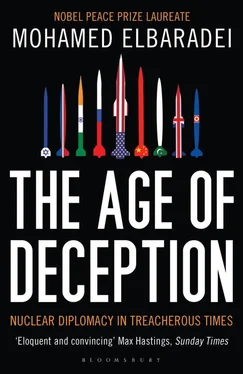Meanwhile, calls for direct U.S. negotiation with Iran were coming from many quarters. The Iraq Study Group, led by former U.S. secretary of state James Baker and U.S. congressman Lee Hamilton, had recommended talks with Iran as far back as December 2006. In a March 2008 interview with Bloomberg News, former secretary of state Henry Kissinger had weighed in, saying, “I think we should be prepared to negotiate about Iran.” [40] Camilla Hall and Mike Schneider, “Kissinger Backs Direct U.S. Talks with Iran,” Bloomberg News, March 15, 2008.
In May, former president Jimmy Carter had strongly criticized the Bush administration for refusing to engage in dialogue with countries with whom the United States had serious differences, calling it a “terrible departure” from past U.S. presidential practice. [41] Joy Lo Dico, “Jimmy Carter Calls for US to Make Friends with Iran after 27 Years,” In de pen dent, May 26, 2008.
The debate heated up further when the Democratic presidential candidate Senator Barack Obama was first reviled and then praised for saying he would, if elected president, engage in direct negotiations with Iran “without conditions.” In a remarkable forum at George Washington University on September 15, five former U.S. secretaries of state—Colin Powell, Madeleine Albright, Warren Christopher, James Baker, and Henry Kissinger—all came out in favor of direct U.S. talks with Iran on its nuclear program. [42] “Five Former U.S. State Secretaries Urge Iran Talks,” Reuters, September 16, 2008.
These sentiments, however, did not translate into progress. On the contrary, the notion of negotiations went into more or less a holding pattern. No one expected the Bush administration, in its final months in office, to make an about-face on dialogue with Iran. From the EU-3 to Iran, everyone seemed resigned to waiting on the outcome of the U.S. elections. Germany’s foreign minister, Frank-Walter Steinmeier, told me that, based on his conversations with Condoleezza Rice, she was quietly getting ready to hand over the Iranian file to the next team.
The P-5+1 had gone through the drill of preparing a package to entice Iran into negotiation, and Javier Solana had traveled to Tehran in mid-June to present it as a “new and improved” offer. But the package clung stubbornly to the hard line of demanding suspension of enrichment as a precondition. When Saeed Jalili met with Solana and the P-5+1 in Geneva in July, British political director Mark Grant demanded an answer on the package within two weeks. Iran, as always, took this domineering style as disrespect and a threat.
This by-now pro forma discussion of course went nowhere. Tehran, operating from a position of strength, was in no rush. And Solana and his colleagues were only going through the motions. With their pile-on of Security Council resolutions, they had firmly driven the nail into the coffin.
12
IRAN, 2009
In Pursuit of a Breakthrough
The Bush administration had maneuvered itself into a corner. By insisting that dialogue could be only a reward for good behavior rather than a tool to accomplish that behavior, Washington had created a hamstrung approach to diplomacy: all principle, no pragmatism. In Iran, the nuclear saga had stumbled from quagmire to quagmire, with negotiations repeatedly short-circuited by the absence of the United States. With the election of Barack Obama as president on November 4, 2008, I hoped to see a return of pragmatism. Two days later, Ahmadinejad sent a congratulatory message to Obama, hoping for “major, fair and real changes, in policies and actions.” [1] Thomas Erdbrink, “Ahmadinejad Congratulates Obama, Urges ‘Real’ Change,” Washington Post, November 7, 2008.
It was widely reported as the first such message from Tehran to a newly elected American president since the 1979 Iranian Revolution.
In his inaugural speech, President Obama was particularly gracious in signaling a change in foreign policy: “To the Muslim world, we seek a new way forward, based on mutual interest and mutual respect. To those leaders around the globe who seek to sow conflict, or blame their society’s ills on the West—know that your people will judge you on what you can build, not what you destroy.”
It was a message perfectly attuned to the moment. The stage was set for something new.
A year earlier, Richard Holbrooke [2] Former assistant secretary of state and former U.S. ambassador to the United Nations.
had suggested that I be ready to come to Washington during the presidential transition phase in late 2008 to advise on engagement with Iran, and possibly to mediate. At the time, Holbrooke was advising Senator Hillary Clinton, then a front-running presidential candidate, on foreign policy. He had asked whether I thought Iran was ready for dialogue with the United States and whether Tehran would make it a precondition that Israel give up its nuclear weapons program. Iran had been ready to engage in dialogue for the past four years, I told him, and I had never heard mention of such a precondition.
I was eager to engage anew with Washington on Iran, yet I was soon surprised at how little contact I had with the new U.S. administration. Hillary Clinton, now secretary of state, sent a letter jointly with Secretary of Energy Steven Chu applauding Agency efforts to develop an “assurance of supply” mechanism for nuclear fuel. Clinton also spoke publicly about the Iranian nuclear program in a way that was less strident than that of her predecessors, and she emphasized the importance of working through the IAEA. [3] On April 9, 2009, Clinton made the following comments during a joint press conference with Australian foreign minister Stephen Smith and U.S. defense secretary Robert Gates: “We don’t know what to believe about the Iranian program…. One of the reasons why we are participating in the P-5+1 is to enforce the international obligations that Iran should be meeting, to ensure that the IAEA is the source of credible information.”
But that was all. There were no calls for a Washington briefing, no attempts to build on what the IAEA had learned. Gregory Schulte, a steadfast advocate of Bush administration policies, remained in place as U.S. ambassador to the IAEA until June. I knew that Obama and his team had inherited a daunting list of domestic challenges, exacerbated by the global financial crisis in late 2008. I knew that Iran’s nuclear program was not the only foreign policy issue on their plate. But I was mindful of my own constraints: my third term as Director General would be complete at the end of November 2009. I had a limited window for collaboration.
The events associated with the Iranian presidential election in June 2009 provoked expressions of concern in many Western countries. There were allegations of rigged votes and outrage at the reports of violence against anti-Ahmadinejad demonstrators. I, too, was distressed by the violence, even as I could not fail to register the double standard in the West’s dealing with Iran. As the leader of the opposition, Mir-Hossein Mousavi had received 33 percent of the vote. His supporters were able to mobilize hundreds of thousands of people to demonstrate in the streets of Iranian cities. By contrast, most of the countries in the Arab world have either sham elections or none at all, yet they are virtually protected from criticism from Western leaders because they are largely supportive of Western policies. Of course, this double standard is not lost on Arab public opinion.
On ABC News, on July 5, 2009, Vice President Biden said that the United States was watching the election results with interest, waiting “to see how this sort of settles out.” Then he seemed to put his foot in his mouth. On the one hand, he said that the U.S. offer to meet with Iran on its nuclear program remained “on the table.” On the other, he implied that Israel, “as a sovereign nation,” had the right to attack Iran’s nuclear facilities. [4] Ryan J. Donmoyer, “Biden Says Israel Has ‘Sovereign Right’ to Hit Iran,” Bloomberg News, July 6, 2009.
Obama tried to contain the damage with a statement on CNN affirming that the United States was committed to a diplomatic solution to the Iranian question. [5] “Obama: No Green Light for Israel to Attack Iran,” CNN, July 7, 2009.
Читать дальше












